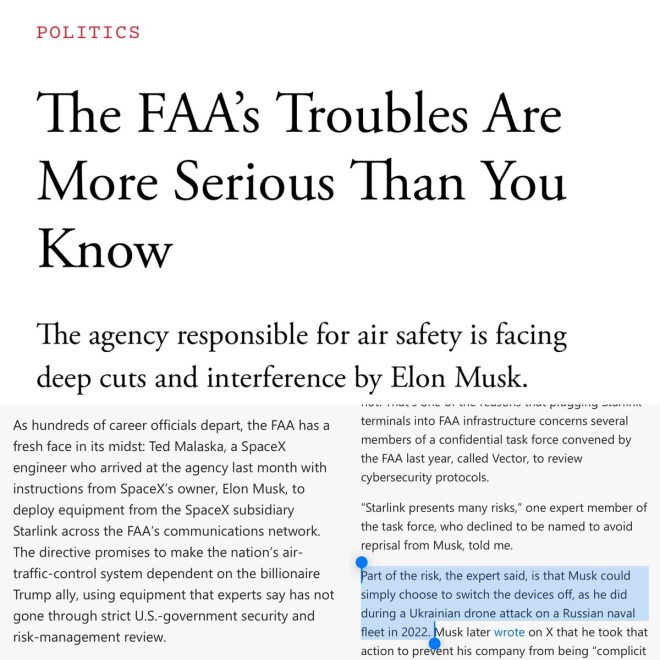
The Risks of Air Traffic Control Reliance on Starlink
In recent discussions surrounding the future of air traffic control in the United States, a concerning scenario has emerged involving Elon Musk’s Starlink satellite internet service. A tweet from The Tennessee Holler highlights the potential risks associated with transforming the nation’s air traffic control systems into a dependency on Starlink, especially under the administration of former President Donald Trump. The tweet raises alarm over Musk’s capability to disable the service at his discretion, likening the situation to something out of a Bond villain narrative.
Understanding Starlink’s Role in Air Traffic Control
Starlink, a project by Musk’s SpaceX, aims to provide high-speed internet access globally through a network of low Earth orbit satellites. While its applications in various sectors are promising, the thought of integrating it into critical infrastructure like air traffic control presents significant risks. The primary concern is the potential for a single entity—Musk or SpaceX—to have the power to disrupt or entirely shut down a vital system that ensures the safety of millions of air travelers.
The Implications of Dependency
The implications of making air traffic control reliant on a private company’s technology can be profound. First and foremost, it raises questions about accountability. In the event of a failure or outage, who would be held responsible? Would it be the Federal Aviation Administration (FAA), which oversees air traffic regulations, or SpaceX, the provider of the service? This ambiguity could lead to catastrophic consequences, particularly if a disruption occurs during peak travel times or in emergency situations.
Financial Motivations and Risks
Another layer of concern is the financial motivations behind such a dependency. The tweet mentions "billions of dollars" tied to this arrangement. Such financial incentives could potentially cloud judgment concerning safety and reliability. If the profitability of Starlink becomes a priority over the integrity of air traffic management, it raises ethical questions about prioritizing profit over public safety.
- YOU MAY ALSO LIKE TO WATCH THIS TRENDING STORY ON YOUTUBE. Waverly Hills Hospital's Horror Story: The Most Haunted Room 502
A Shift in Control
The concept of allowing a private entity to control a public utility is not new, but it has taken on a new dimension with personalities like Musk at the helm. The idea that a single individual could wield such influence over critical infrastructure is unsettling. It not only poses risks to air travel but also sets a precedent for other sectors to follow suit. If air traffic control can be privatized in such a manner, what’s to stop other essential services from doing the same?
The Call for Caution
The tweet’s reference to "Bond villain territory" underscores the need for caution in moving forward with such plans. The juxtaposition of innovative technology against the backdrop of potential misuse serves as a stark warning. Policymakers and regulators must take these concerns seriously and consider the long-term implications of relying on a private company for public safety operations.
Regulatory Oversight is Essential
To mitigate risks, strong regulatory oversight must be established. This would involve a comprehensive assessment of the technology’s reliability, security, and the potential for monopolistic behavior. Ensuring that multiple companies can compete to provide such services could also dilute the risk of a single point of failure.
Public Perception and Trust
Public perception plays a critical role in the acceptance of new technologies, especially those that impact safety. The notion of air traffic control being tied to a private entity could evoke distrust among travelers and industry stakeholders. Building trust will require transparency about how the technology works, its reliability, and contingency plans in case of service outages.
The Need for a Balanced Approach
While technology like Starlink offers revolutionary possibilities for communication and data transmission, a balanced approach is vital. Policymakers must weigh the benefits against the risks and consider alternative solutions that could enhance air traffic control without rendering it vulnerable to the whims of a private corporation.
Conclusion
The conversation sparked by The Tennessee Holler’s tweet serves as a crucial reminder of the complexities involved in integrating advanced technology into public infrastructure. As we navigate this new era of innovation, it is essential to prioritize safety, accountability, and public trust. The potential for misuse of power in critical sectors like air traffic control cannot be overlooked. Instead of rushing into dependency on a single technology provider, stakeholders must engage in thoughtful dialogue and establish robust regulatory frameworks that ensure the safety and reliability of air travel for all.
In summary, while the integration of Starlink into air traffic control could enhance operational efficiency, it also presents significant risks that must be addressed. A careful, balanced approach will be essential to navigate the future of air travel safely and effectively.

ATLANTIC: “Part of the risk (of Trump letting Musk make air traffic control dependent on Starlink for billions of dollars) is Musk could simply choose to switch it off.”
We have reached Bond villain territory. https://t.co/o6DYcVOJak pic.twitter.com/j7ww4fju5M
— The Tennessee Holler (@TheTNHoller) March 11, 2025
